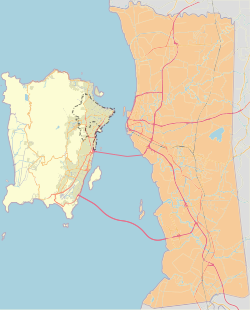People's Court is a residential neighbourhood within the city of George Town in the Malaysian state of Penang. Situated within the city's central business district, it comprises three four-storey blocks of walk-up flats.[1] Built in 1961, it was the first low-cost public housing in Malaysia and remains one of the few populated residential pockets within the city's UNESCO World Heritage Site.[2][3]
People's Court | |
|---|---|
Neighbourhood of George Town | |
| Other transcription(s) | |
| • Mandarin | 生活公市 (Simplified) 生活公市 (Traditional) Shēnghuó gōng shì (Pinyin) |
| • Hokkien | Kong-tshī (Tâi-lô) |
| • Tamil | மக்கள் மன்றம் Makkaḷ Maṉṟam (Transliteration) |
 | |
 | |
| Coordinates: 5°25′2.658″N 100°20′2.274″E / 5.41740500°N 100.33396500°E | |
| Country | |
| State | |
| City | |
| Founded | 1961 |
| Government | |
| • Local government | Penang Island City Council |
| • Mayor of Penang Island | Rajendran P. Anthony |
| • Komtar State Assemblyman | Teh Lai Heng (DAP) |
| • Tanjong Member of Parliament | Lim Hui Ying (DAP) |
| Time zone | UTC+8 (MST) |
| • Summer (DST) | Not observed |
| Postal code | 10200 |
| Website | mbpp |
History
editAfter Malaya's independence in 1957, the George Town City Council faced the challenge of providing affordable housing for the urban poor. A significant number of the city's residents lived in substandard houses within urban kampongs and shophouses. According to a councillor at the time, "there are about 30 kampongs within George Town's limits with about 5,539 substandard houses inhabited by approximately 50,153 people. In about 19 kampongs the Malays are predominant and in the rest there is a mixture of Malays/Chinese and Malays/Indians."[4]
The George Town City Council sought to address affordable housing as a crucial electoral issue, particularly after the Labour Party retained control in the 1959 local election.[1][5] As part of their efforts, the city government initiated People's Court, the first low-cost public housing project in Malaya. The project consisted of three blocks of four-storey walk-up flats arranged in an 'L' shape within the city centre's Chinatown.[1][2][4] These blocks include 26 shoplots, ranging from 136 sq ft (12.6 m2) to 582 sq ft (54.1 m2), along with 79 residential units, ranging between 438 sq ft (40.7 m2) to 506 sq ft (47.0 m2).[6]
Since its completion in 1961, People's Court has served as a major source of low-cost housing within George Town's central business district.[1][4][5] In spite of the continuing depopulation of the city centre, People's Court remains one of the few inhabited residential areas within the locality.[3] The three blocks are currently owned and managed by the Penang Island City Council, which succeeded the George Town City Council.[1][6]
References
edit- ^ a b c d e Lo, Tern Chern (30 Aug 2023). "Penang's People's Court awaits hopeful future". The Star. Retrieved 4 Apr 2024.
- ^ a b "REFSA Quarterly issue 1 2015" (PDF). REFSA. 2015. Archived (PDF) from the original on 2 June 2023. Retrieved 19 December 2023.
- ^ a b "George Town World Heritage Site: Population and Land Use Census 2009—2019" (PDF). Think City. 2021. Archived (PDF) from the original on 4 December 2023. Retrieved 22 December 2023.
- ^ a b c Penang Past and Present, 1786-1963. George Town: George Town City Council. 1966. pp. 98–99.
- ^ a b Woo, Kuan Heong; Khoo, Suet Leng (Jun 2023). "Affordable Housing and Public Administration of a Historic City: The Perspective of a Local Community in a UNESCO World Heritage Site, George Town, Penang State of Malaysia". Journal of Urbanism International Research on Placemaking and Urban Sustainability. Universiti Sains Malaysia: 1–29. doi:10.1080/17549175.2023.2224294 – via ResearchGate.
- ^ a b Ong, K. H. (12 Dec 2023). "Facelift for People's Court". Buletin Mutiara. Retrieved 4 Apr 2024.
